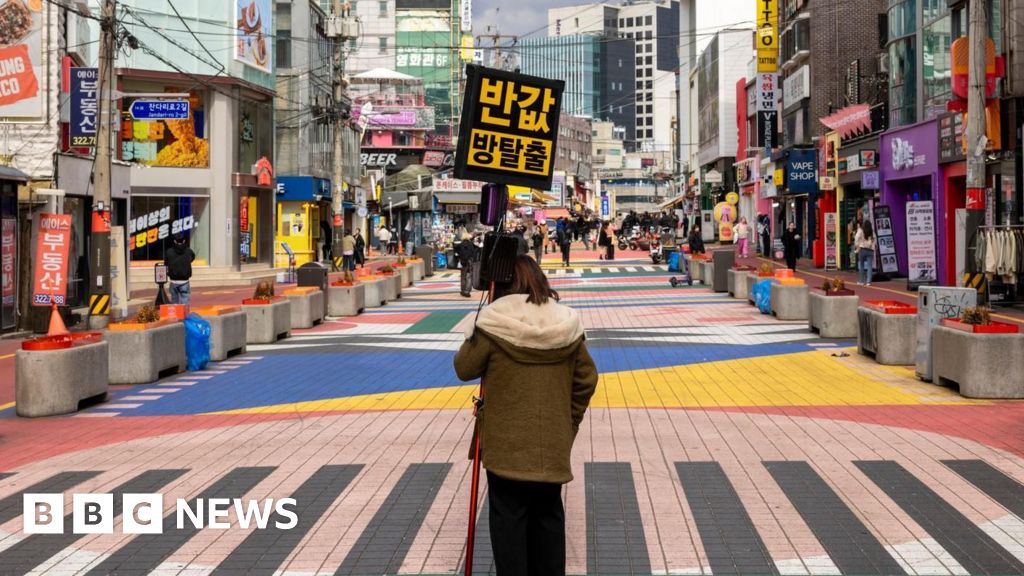BBC News in Seoul
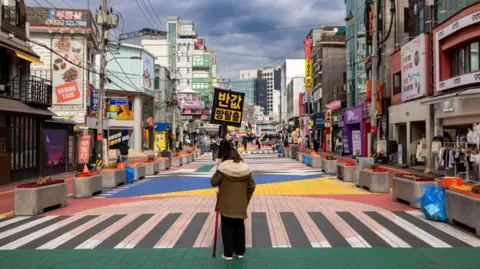 Getty Images
Getty ImagesHee-kyung giggles as she steps into Seoul’s new “warm-hearted convenience store”.
At 29, she is perhaps not the person most would have imagined wanting to take advantage of the South Korean capital’s latest efforts to combat loneliness.
But Hee-Kyung visits every day to grab the free instant ramen noodles and spend hours chatting with other visitors and social workers.
“I tell myself, ‘another day, another escape from feeling lonely’,” Hee-kyung says.
A teenage runaway, she no longer talks to anyone from her family. The friends she has she met online, through the shared love of K-pop group SuperJunior, and they live far away. Currently unemployed, she has no work mates to chat to.
She lives alone, and whiles away the time watching cute animal videos on her phone as she lies on the floor.
“I have no other place to go if it weren’t for [the store].”
Hee-Kyung is one of 20,000 people to visit the four stores since they were opened in March. The city had been expecting just 5,000 in the first year.
This particular location, in the city’s north-eastern district of Dongdaemun, sees around 70 to 80 visitors each day.
Most are in their 40s and 50s, but Hee-Kyung is far from being the only young person to access the store’s services.
A 2022 study revealed an estimated 130,000 young people in the city – those aged between 19 and 39 – are either socially isolated or shut in. That same study also found the share of single-person households in the capital had reached nearly 40% – that alarmed a government that has been trying to reverse plummeting birth and marriage rates.
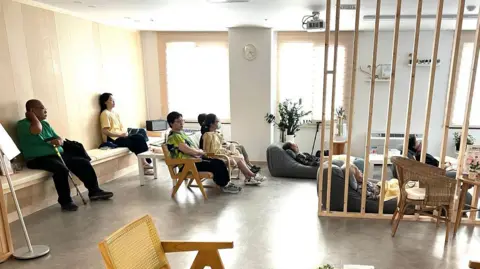 Jake Kwon/ BBC
Jake Kwon/ BBCThe day the BBC visited, around a dozen visitors – men and women, young and old – were sitting on benches or burrowed into beanbags, watching a film together.
“We have movie days to encourage low-level bonding,” whispers Kim Se-heon, the manager of the city’s Loneliness Countermeasure Division.
The stores are designed to offer a warm, cafe-like atmosphere. In one corner, an older woman closed her eyes as she sank into the automatic massage chair that hummed. In another, there are stacks of noodles.
“Ramen is a symbol of comfort and warmth in South Korea,” Kim explains.
While waiting for the noodles to cook, visitors are asked to fill out a brief survey on their mood and living conditions.
These are just a handful of the growing number of socially isolated people that the city is trying to reach.
The change South Korea has undergone is seismic: in a generation, it has gone from a war-torn agrarian society to a developed economy.
A few decades ago, it was common to see large families with six to eight children, living under the same roof. But years of migration to cities have shrunk families and turned places like Seoul into sprawling metropolises.
Unaffordable housing, rising costs and gruelling working hours have led more and more young people to reject marriage or parenthood, or both. On the other end is an ageing population that feels neglected by children who are racing to keep up.
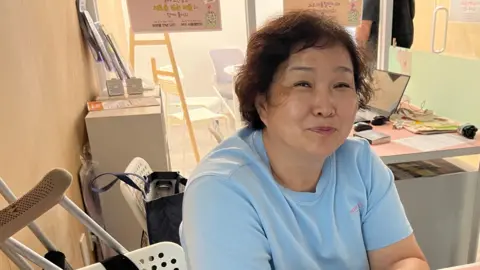 Jake Kwon/ BBC
Jake Kwon/ BBC“You know the saying that the least tasty meal is the one you are having alone? I ask older people who come in if they were eating okay. They would tear up, just being asked that question,” says Lee In-sook, the counsellor at the store.
After a divorce and her grown-up children leaving home, she understands how it feels to be alone.
The first time Hee-kyung – who is around the age of In-sook’s daughter – arrived at the store, she immediately caught her eye.
Like many visitors, Hee-kyung was quiet on the first day, barely speaking to others. The second time she came, she began to speak to In-sook.
It was the growing number of “lonely deaths” that worried Seoul officials enough to act. Older people were dying alone at home, and their bodies were not discovered until days or weeks later.
That mission soon expanded to tackling loneliness itself. But Seoul is not the first to do this.
In 2018, the UK appointed a Minister for Loneliness. Japan followed the example, establishing an agency to address the problem which it said had become more pronounced in the Covid-19 pandemic.
The phenomenon of withdrawing from society altogether is common enough in Japan that it has a name: hikikomori. In South Korea too, a rising number of young people have been voluntarily cutting themselves off from a highly competitive and exacting society.
“Perhaps it was the pandemic that led to this,” muses Lee Yu-jeong, who manages one of Seoul’s anti-loneliness programmes.
She points out how her children remain buried in their smartphones when their friends visit. “People today express how difficult it is to have a network of friends. Loneliness has become something that needs to be tackled as a society.”
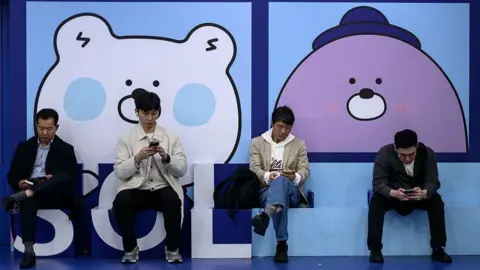 Getty Images
Getty ImagesThe first step was opening a hotline for people who need someone to speak to. A nationwide survey in 2023 found that a third of Korean adults have either no one to ask for help with housework or speak to when feeling sad.
Its counselors offer a 40-minute call to discuss any topic. Park Seung-ah has been making three calls a day from her cubicle.
“I was surprised to see that many young people wanted these sessions. They want to share the burden on their chest but there is often a power dynamic with parents or their friends. So they come to us.”
The “warm-hearted convenience stores” followed swiftly, a physical location where the lonely were welcome.
The Dongdaemun location was picked due to its proximity to low-income housing, where residents live in tiny, subdivided apartments alone.
Sohn, 68, visits the store once a week to watch films, and to escape his cramped home.
“[The stores] should have opened before I was born. It’s good to spend even just two to three hours,” he says.
Sohn has spent more than five decades of his life caring for his mother, who suffered a brain aneurism when he was a child. As a result, he never married or had children.
The cost of the dedication became clear when she died.
Penniless and walking with a cane since suffering a brain haemorrhage himself several years ago, he says there aren’t many places for him.
“Places cost money, going to the cinema costs money,” he says.
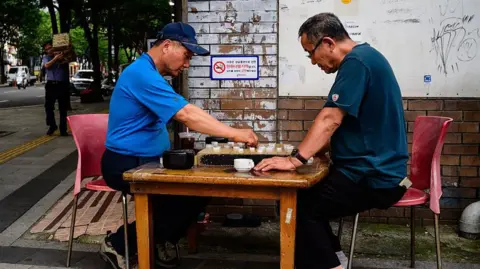 Getty Images
Getty ImagesThe stores were created specially to welcome those who aren’t welcome in other places, explains store manager Lee Bo-hyun.
They go beyond a bit of room and a film – offering air-conditioning during the hottest summer months to those on low incomes who cannot afford it at home.
It is also supposed to be a space where the lonely can sidestep the stigma of asking for help. The choice of name – “convenience stores” – was a deliberate attempt to distance them from psychiatric clinics, important in a country where there is still a stigma against asking for help for mental health – especially among older residents.
And yet, some of their reservations can still be seen when they walk through the door for the first time, compounded by their experience of isolation.
Visitors are often uncomfortable speaking to another person or eating together initially, store manager Lee says.
“The typical loneliness, if that repeats for days, months, and half year, that is now more than a feeling,” Lee explains.
“Those folks start to avoid places with people. So many people ask us if they can take the ramen to go because they won’t eat with others.”
Lee would tell them that they don’t need to talk. They can simply sit at the same table and have noodles.
It has been months since Hee-kyung was one of the quiet new arrivals.
So, has it made a difference? In-sook recalls a conversation she was having with a local paper. When she brought up her daughter, she felt a sudden pang and her voice broke.
“I am going to hug you,” Hee-kyung declared.
She walked over from the other side of the room and embraced In-sook.


